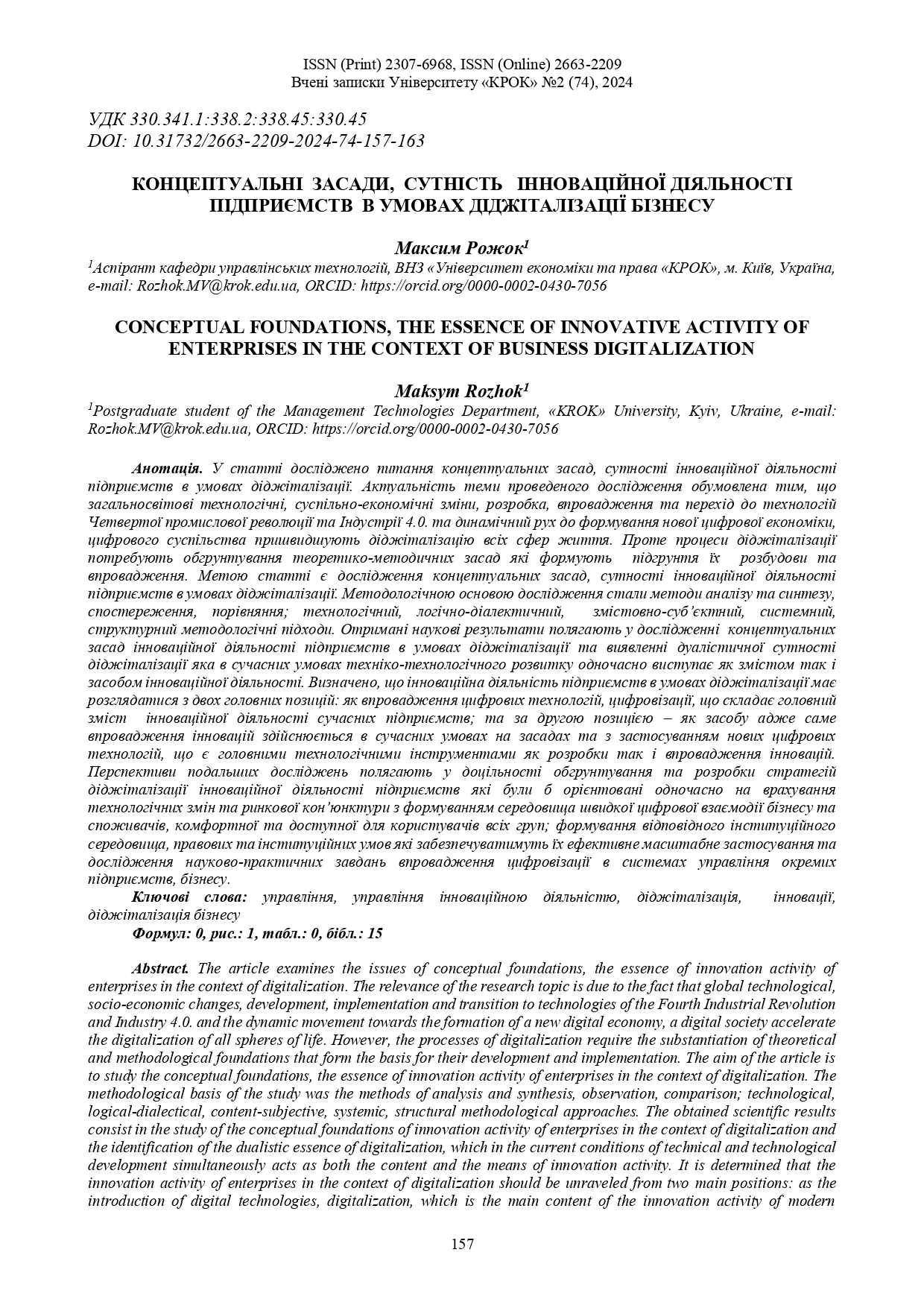CONCEPTUAL FOUNDATIONS, THE ESSENCE OF INNOVATIVE ACTIVITY OF ENTERPRISES IN THE CONTEXT OF BUSINESS DIGITALIZATION
DOI:
https://doi.org/10.31732/2663-2209-2024-74-157-163Keywords:
management, innovation management, digitalization, innovation, digitalization of businessAbstract
The article examines the issues of conceptual foundations, the essence of innovation activity of enterprises in the context of digitalization. The relevance of the research topic is due to the fact that global technological, socio-economic changes, development, implementation and transition to technologies of the Fourth Industrial Revolution and Industry 4.0. and the dynamic movement towards the formation of a new digital economy, a digital society accelerate the digitalization of all spheres of life. However, the processes of digitalization require the substantiation of theoretical and methodological foundations that form the basis for their development and implementation. The aim of the article is to study the conceptual foundations, the essence of innovation activity of enterprises in the context of digitalization. The methodological basis of the study was the methods of analysis and synthesis, observation, comparison; technological, logical-dialectical, content-subjective, systemic, structural methodological approaches. The obtained scientific results consist in the study of the conceptual foundations of innovation activity of enterprises in the context of digitalization and the identification of the dualistic essence of digitalization, which in the current conditions of technical and technological development simultaneously acts as both the content and the means of innovation activity. It is determined that the innovation activity of enterprises in the context of digitalization should be unraveled from two main positions: as the introduction of digital technologies, digitalization, which is the main content of the innovation activity of modern enterprises; and the second position – as a means, because it is the introduction of innovations that is carried out in modern conditions on the basis and with the use of new digital technologies, which are the main technological tools for both the development and implementation of innovations. Prospects for further research lie in the expediency of substantiating and developing strategies for digitalization of innovation activities of enterprises, which would be focused simultaneously on taking into account technological changes and market conditions with the formation of an environment of rapid digital interaction between business and consumers, comfortable and accessible to users of all groups; formation of an appropriate institutional environment, legal and institutional conditions that will ensure their effective large-scale application and research of scientific and practical tasks of introducing digitalization in the management systems of individual enterprises and businesses.Downloads
References
Гудзь, О.Є. (2018). Цифрова економіка: зміна цінностей та орієнтирів управління підприємствами. Економіка. Менеджмент. Бізнес. № 2(24). С. 4-12.
Косинський, В.І., & Швець, О.Ф. (2012). Сучасні інформаційні технології. К.: Знання. 319 с.
Мешко, Н. П. (2012). Стратегії високотехнологічного розвитку в умовах глобалізації: національний та корпоративний аспекти: монографія. Донецьк: Юго-Восток. 470 c.
Коляденко, С. В. (2016). Цифрова економіка: передумови та етапи становлення в Україні та світі. Менеджмент: актуальні питання науки і практики. № 6. С. 105-112.
Соколова, Г. Б. (2018). Деякі аспекти розвитку цифрової економіки в Україні. Економічний вісник Донбасу. № 1(51). С. 92-96.
Клименко, К. В. (2020). Діджіталізація як інноваційний розвиток підприємств:досвід України. Вісник Хмельницького національного університету. № 4. Том 3. С. 13-18.
Лазоренко, Т., & Шолом, І. (2020). Діджиталізація як основний фактор розвитку бізнесу. Збірник тез доповідей міжнародної науково-практичної конференції: Бізнес, інновації, менеджмент: проблеми та перспективи. №1. C.50-51. URL: http://confmanagement.kpi.ua/proc/article/view/201186
Асоціація підприємств промислової автоматизації України. (2019). Стратегія розвитку Індустрія 4.0. К.: АППАУ. 78 c. URL: https://appau.org.ua/en/ category/pubs
Король, С. (2019). Діджиталізація економіки як фактор професійного розвитку. Modern Economics. Вип. №18. С. 67-73. URL:http://217.77.213.157:8080/jspui/bitstream/123456789/6619/1/korol.pdf.
Лігоненко, Л., Хріпко, А., & Доманський, А. (2018). Зміст та механізм формування стратегії діджиталізації в бізнес-організаціях. Інтернаука: Економічні науки. № 22 (62). С. 21-24.
De Clerck, J. P. (2020). Digitization, digitalization and digital transformation: the differences URL: https://www.iscoop.eu/digitization-digitalization-digitaltransformation-disruption/
Гуренко, А. & Гашутіна, О. (2018). Напрями розвитку систем управління в умовах діджіталізації бізнесу в Україні. Економіка і суспільство. №19. С.739-745.
Hrybinenko, O. M. (2018). Digitalization of the economy in a new paradigm of digital transformation. International Relations, Part. Economic sciences. №.16, pp. 35–37.
Устенко, М. & Руських, А. (2019). Діджиталізація: основа конкурентоспроможності підприємства в реаліях цифрової економіки. Вісник економіки транспорту і промисловості. № 68. С.181-192.
Климчук, О. В. (2021). Сучасні тренди та глобалізаційні виміри управління інформаційними технологіями і системами в Україні. Економіка і організація управління. № 1 (41). С. 72-85.
Дубина, М., & Козлянченко, О. (2019). Концептуальні аспекти дослідження сутності діджіталізації та її ролі в розвитку сучасного суспільства. Проблеми і перспективи економіки та управління. № 3 (19). С. 21-32.

Downloads
Published
How to Cite
Issue
Section
License

This work is licensed under a Creative Commons Attribution-NonCommercial 4.0 International License.

